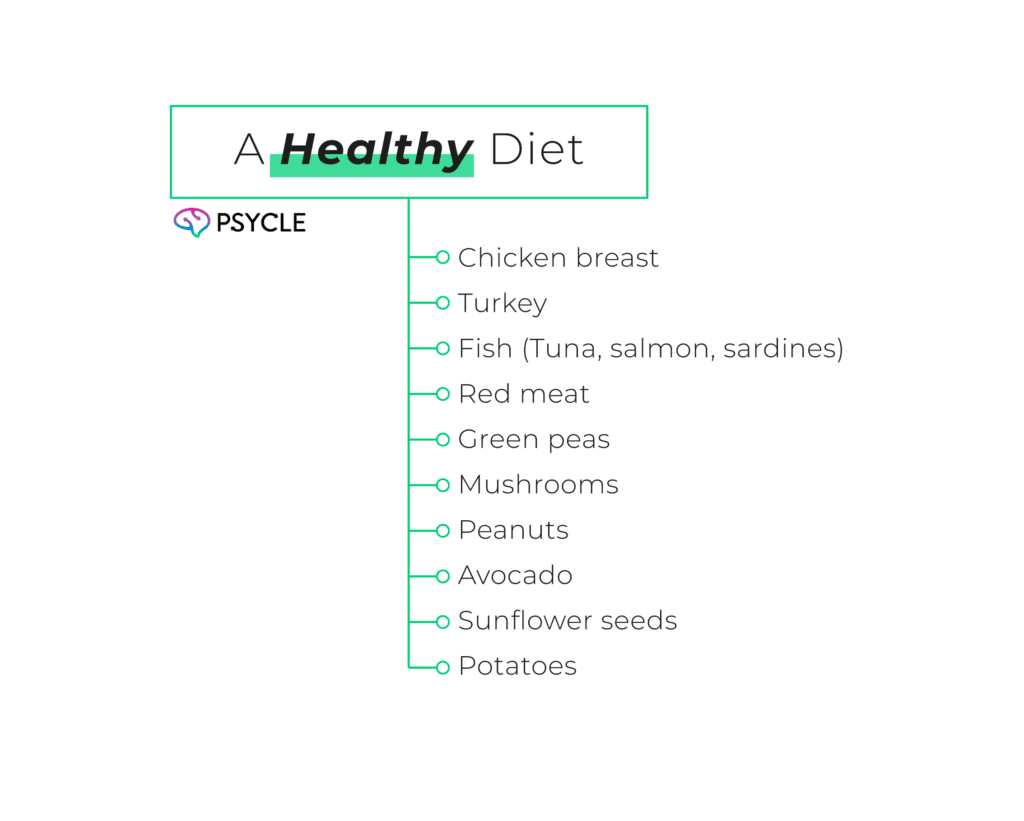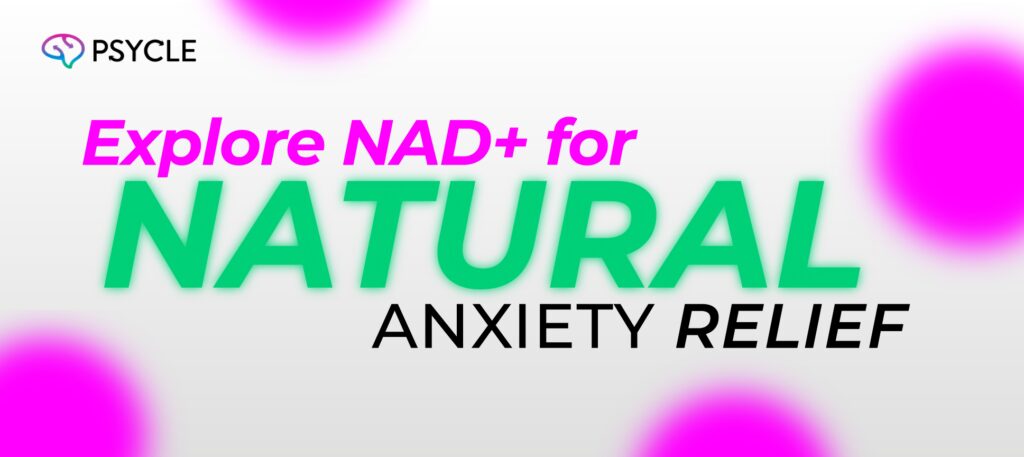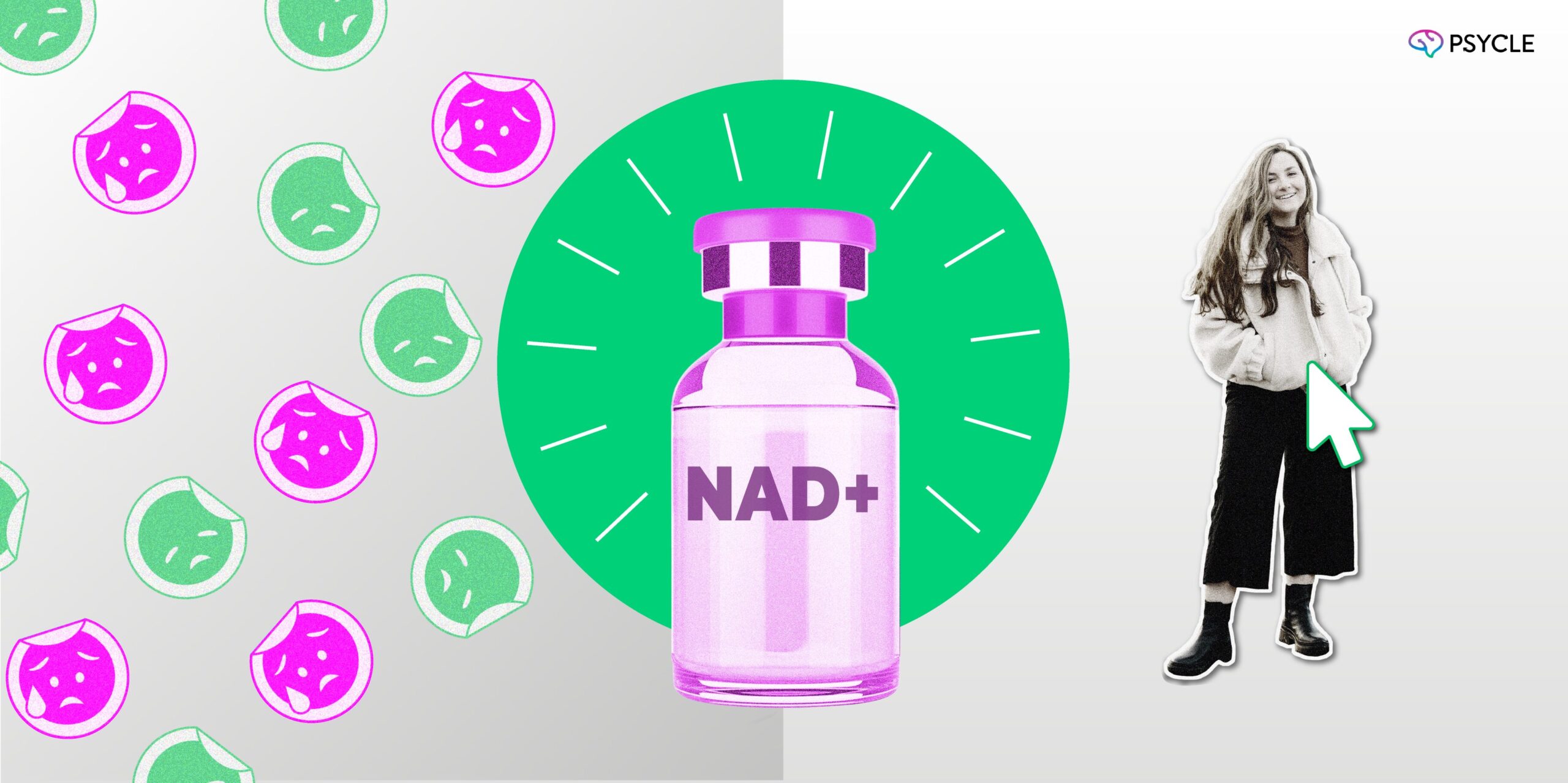Anxiety symptoms can significantly impact our daily lives, affecting our mood, productivity, and overall well-being. Approximately 31% of U.S. adults experience any anxiety disorder at some time in their lives, leading many individuals to seek effective ways to manage anxiety and regain control of their mental health. In recent years, there has been growing interest in the potential benefits of NAD+, or NAD, in alleviating anxiety symptoms.
NAD+ is a coenzyme that plays a crucial role in various chemical reactions in the body. It is involved in energy production and is essential for proper cell function. Research suggests that NAD+ may be connected to mental health and could have potential in managing anxiety symptoms.
This article explores the potential relationship between NAD+ and anxiety, delves into the role of NAD+ in the body, and examines how increasing NAD+ levels may offer benefits for brain function and mood.
It is essential to note that while NAD+ shows promise, further research is needed to understand its effectiveness.
Key Takeaways
- NAD+, or nicotinamide adenine dinucleotide, is a coenzyme that plays a vital role in various chemical reactions in the body.
- Studies suggest that low levels of NAD+ may be linked to anxiety symptoms.
- NAD+ helps with energy production and supports optimal brain function and stress response.
- Ways to increase NAD+ levels include a healthy diet, supplements, and lifestyle changes.
- NAD+ supplementation shows promise in managing anxiety but requires further research. Consult with a healthcare professional before starting any new treatment.
- Looking for a natural way to support calm and clarity? Try the Ion Layer NAD+ Patch.
The Role of NAD+ in the Body
NAD+ is a vital coenzyme derived from vitamin B3. This essential molecule serves as a precursor for critical chemical reactions involved in your body’s ability to produce energy. By facilitating the conversion of food into ATP (adenosine triphosphate), the primary energy currency of the body, NAD+ plays a fundamental role in maintaining overall cellular function.
ATP is the powerhouse that fuels various cellular processes, including muscle contraction, protein synthesis, and neural activity. Your body needs enough ATP to fuel your day and function at its best. Food is converted into ATP through a series of chemical reactions in the mitochondria, the powerhouses of the cells.
A well-functioning energy production process is essential for the brain’s health and function. When our brain cells have enough energy, they can perform their tasks more efficiently, including those related to mood regulation.
The Potential Link Between NAD+ and Anxiety
Anxiety is a common mental health condition affecting millions of people worldwide. It is characterized by persistent feelings of fear, worry, and unease. While there are several treatment options available, including therapy and medication, there is growing interest in exploring alternative approaches that target the underlying mechanisms of anxiety.
While research suggests that NAD+ may have potential in managing anxiety symptoms, it is important to note that more studies are needed to establish its effectiveness and determine the appropriate dosage. However, based on existing evidence, NAD+ supplementation shows promise in supporting mental well-being and could be considered as part of a comprehensive approach to anxiety management.
Vitamin B3 is a key player in making sure your body has enough NAD+. Research has shown that individuals with vitamin B3 deficiency may experience mood disorders, such as anxiety and depression.
NAD+ deficiency can occur as a result of various factors, including chronic stress, poor diet, alcohol abuse, and even genetics. In 2022, a study found that variations in the body’s ability to produce NAD may be associated with the risk of developing major depressive disorder.
NAD+ is also important for the activation of a group of enzymes known as sirtuins. Sirtuins are involved in regulating cellular health, including DNA repair, inflammation reduction, and protection against stressors. By activating sirtuins, NAD+ may help alleviate stress and inflammation in the brain, which are associated with mood disorders.
While NAD+ is not directly involved in the synthesis of serotonin (a key neurotransmitter affecting mood), the pathways that produce NAD+ are linked with those that produce important neurotransmitters. A deficiency in NAD+ could potentially disrupt these pathways, leading to an imbalance in neurotransmitter levels and affecting mood.
In one report, three separate case studies involved three patients with anxiety disorders who received 2,000-2,500 mg of niacinamide (a form of vitamin B3) daily. Each patient experienced considerable anxiety relief, which the author speculated could be attributed to the correction of a vitamin B3 deficiency, niacinamide’s sedative-like effects, its ability to raise serotonin levels, or its ability to modify lactic acid metabolism—but this is a report with a small sample size, so we can’t extrapolate findings just yet.
While more research is needed to fully understand the underlying mechanisms and optimal dosage for NAD+ supplementation, the existing evidence points towards its potential as a valuable tool in mood management.
Understanding the link between NAD+ deficiency and anxiety opens up new avenues for treatment and provides hope for individuals seeking relief from their symptoms. By addressing the underlying cellular dysregulation, NAD+ supplementation may offer a more comprehensive approach to anxiety management.
It is important to note that NAD+ supplementation should always be pursued under the guidance of a healthcare professional. They can provide personalized recommendations based on individual needs and ensure the safety and effectiveness of the treatment.
Support your mental well-being from the inside out. The Ion Layer NAD+ patch makes it easy to keep your levels steady — no pills, no stress.

Methods to Increase NAD+
To maintain optimal NAD+ levels in the body, there are several effective methods that can be incorporated into your daily routine. By focusing on your diet, supplements, and lifestyle, you can support the synthesis and production of NAD+.
A Healthy Diet

A diet rich in niacinamide-containing foods can provide the necessary precursors for NAD+ synthesis. Incorporate foods like:
- Chicken breast
- Turkey
- Fish such as tuna, salmon, and sardines
- Red meat
- Green peas
- Mushrooms
- Peanuts
- Avocado
- Sunflower seeds
- Potatoes
Supplements for NAD+ Production
In addition to dietary sources, supplements can be taken to support NAD+ production.
Niacinamide and nicotinamide riboside are popular options that can be easily incorporated into your daily routine. It is crucial to choose high-quality NAD+ supplements from reputable sources.
This ensures that you are getting a reliable and pure product that is free from contaminants. When purchasing NAD+ supplements, look for reputable brands that undergo third-party testing to ensure quality and safety.
Always consult with a healthcare professional before starting any new supplements to ensure appropriateness and correct dosages.

Lifestyle Factors
Managing stress, getting enough sleep, and engaging in regular physical activity are vital lifestyle factors that can contribute to maintaining optimal NAD+ levels. Stress reduction techniques such as meditation, yoga, and deep breathing exercises can help manage stress levels and support NAD+ production.
By adopting these methods, you can actively increase NAD+ levels in your body and support the overall health and well-being of your cells.
Safety and Considerations
When it comes to NAD+ supplementation, safety and proper dosage are essential. While NAD+ supplementation is generally considered safe, it is always recommended to consult with a healthcare professional before starting any new treatment.
An experienced healthcare professional can provide guidance on the appropriate dosage of NAD+ supplementation based on your individual needs and health conditions. They can also assess any potential interactions with medications you may be taking, ensuring your safety and well-being.
Remember, NAD+ supplementation is just one aspect of a comprehensive approach to wellness. It is important to maintain a well-rounded lifestyle that includes a balanced diet, regular exercise, stress management techniques, and adequate sleep.
Conclusion
NAD+ supplementation has the potential to play a role in managing anxiety symptoms and supporting overall mental well-being.
However, it should be approached as part of a comprehensive treatment plan that considers individual needs and is guided by healthcare professionals. However, to fully understand its effectiveness and determine the optimal dosage, further research is needed.
FAQs
Does NAD Help with Anxiety?
Emerging evidence suggests that NAD+ may have an impact on mood due to its role in energy production and supporting overall cellular function, but more research is needed.
What is the Role of NAD+ in the Body?
NAD+ is a coenzyme derived from vitamin B3 that aids in the conversion of food into ATP, the body’s main energy currency, playing a crucial role in maintaining overall cellular function.
How is NAD+ Linked to Anxiety?
Studies have shown that individuals with low levels of vitamin B3, which the body uses to produce NAD+, may experience anxiety symptoms. Increasing NAD+ levels may help alleviate mood challenges by restoring energy production and supporting overall cellular function.
What Methods Can Be Used to Increase NAD+ Levels?
NAD+ levels can be increased through a healthy diet rich in niacinamide-containing foods, supplements such as niacinamide or nicotinamide riboside, and lifestyle factors like managing stress, getting enough sleep, and engaging in regular physical activity.
What is the Potential of NAD+ in Managing Anxiety?
NAD+ supplementation shows promise in supporting mental well-being and could be considered as part of a comprehensive approach to anxiety management. However, more studies are needed to establish its effectiveness and determine the appropriate dosage.
What is the Connection Between NAD+ and Other Mental Health Conditions?
NAD+ supplementation has been investigated for its potential role in neurodegenerative disorders such as Alzheimer’s disease and in chronic fatigue syndrome. Further research is needed to fully understand the effects of NAD+ in these conditions.
Is NAD+ Supplementation Safe?
NAD+ supplementation is generally considered safe. However, it is always recommended to consult with a healthcare professional before starting any new treatment to determine the appropriate dosage and assess potential interactions with medications or existing health conditions.
What is the Conclusion Regarding NAD+ and Anxiety Management?
NAD+ shows promise in managing and supporting overall mental well-being. While further research is needed to fully understand its effectiveness and optimal dosage, NAD+ supplementation should be considered as part of a comprehensive approach to anxiety management in consultation with healthcare professionals.

